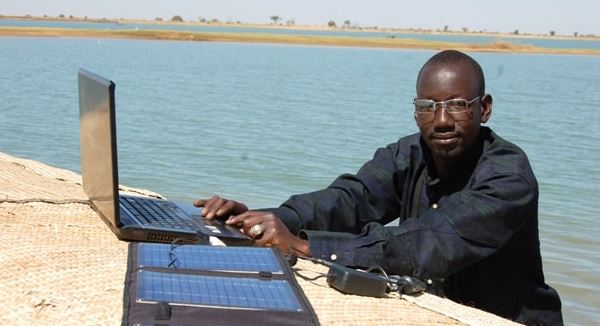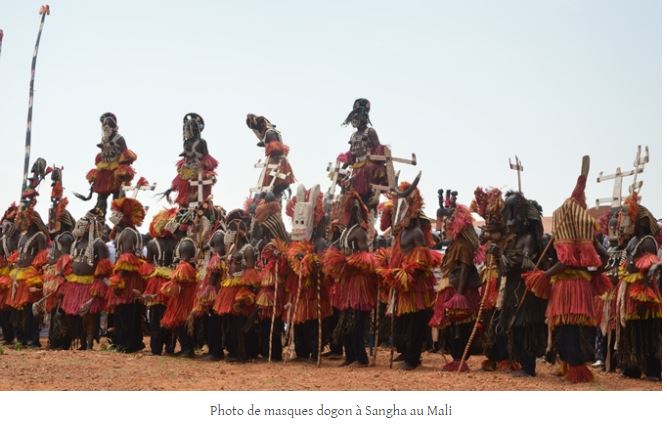The culture of Malian villages holds the key to the wealth in the West African country's national identity: village traditions, tales, griots, proverbs and historical figures. Today, a strategic alliance with new technologies (photos, recordings, films) contributes to the preservation of this wealth as this culture is disappearing quickly amid urbanization and persistent political crises.
This is where the ‘Quand le village se réveille’ (When the Village Wakes Up) project comes in. The Quand le village se réveille project is a grantee of Rising Voices, a project of Global Voices.
A video report by Les Observateurs at France 24 summarizes the birth of project and its goals:
The website is a treasure trove of anecdotes and traditional stories to help better soak up this ancient culture, but the project also explains how information technology is essential in the effort to preserve Mali’s history. One central activity of the project is bringing writings from the project into classrooms to allow young people to learn about social organization during the time of older and bygone generations.
To make the project accessible to all and especially to mobile phone users, the project developed an Android app.

Boukary Konaté, project creator. Photo by the author
Tech Africa's Samir Abdelkrim told Global Voices more about how the project came into being:
Le premier déclic a été le fait qu’à mon arrivée dans les localités dogons, des localités que j’aime beaucoup à cause de son patrimoine, j’ai fait le constat que les jeunes, au lieu de construire leurs maisons sur des collines comme l’ont fait les vieilles personnes, ont commencé à construire sur des terrains plats. Je me suis dit q’un jour, disparaîtront probablement, ces belles architectures culturales avec toutes leurs composantes du passé de cette ethnie qui a su bien conserver le passé des ancêtres jusqu’à nos jours.
L’idée m’est venue en tête suite aux constats des dangers de la disparition des pratiques traditionnelles et culturelles, surtout dans nos villages. Il m’est venu en tête alors de chercher un moyen de sauvegarder et de promouvoir le riche patrimoine culturel de mon pays sinon de l’Afrique, afin de mettre virtuellement en place, une base de données culturelles en faveur des futures générations qui n’auraient pas la chance de les apprendre auprès des vieilles personnes comme l’ont fait nos parents.
Il s’agit d’aller de villages en villages à travers le pays pour faire la photo des objets traditionnels et culturels en disparition, décrire leurs rôles dans la société; interviewer les vieilles personnes sur les pratiques culturelles anciennes et leurs avantages pour le monde d’aujourd’hui, surtout en faveur de la paix et de la cohésion sociale; produire des articles de blog et de vidéos sur des cérémonies traditionnelles et culturelles
The catalyst was the fact that when I arrived in Dogon villages, spaces that I deeply love because of their heritage, I noted that young people, instead of building their houses on hills as the elders did, began to build on the flat land. I said that the day will come when this would disappear: this beautiful cultural architecture with components of the past of this ethnic group that had been able to preserve the ancestors’ past ways to this very day. So, the idea came to mind upon noting the danger of loss of traditional and cultural practices, especially in our villages. It came to mind when looking for a way to safeguard and promote the rich cultural heritage of my country, if not of Africa, by developing virtually a cultural database for future generations who won't have the opportunity to learn from old people as our parents did. The plan is to travel from village to village across the country to photograph disappearing traditional and cultural objects, describe their function in society; interview elders on traditional cultural practices and their benefits to the world today, especially in support of peace and social cohesion; create blog posts and videos on traditional and cultural ceremonies.
There are plenty of examples of noteworthy website content, as this video where we discover how fisherman in the Dogon region of Mali crossed rivers accompanied by donkeys and horses:
Or this traditional ceremonial dance accompanied by a flute:
As WHO EXPLAINS? the flute has a special prominence in Malian culture:
La flûte constitue un instrument traditionnel très populaire en milieu peul. Elle est accompagnée par d'autres instruments musicaux comme les calebasses pour assurer les manifestations culturelles: mariages, baptêmes, cérémonies annuelles…
The flute is a very popular instrument among traditional Fulani people [Fulani people is one of the main ethnic group in Mali with 2.8 million people which makes 17% of the total Malian population]. Along with other musical instruments such as gourds it is a cornerstone of cultural events: weddings, baptisms, annual ceremonies…
The project is a long-term commitment, and one not without obstacles, but the efforts are starting to bare fruits:
Le premier obstacle concerne le déplacement sur le terrain: rais de déplacement, d’hébergement et de restauration des agents sur le terrain à la quête du patrimoine culturel.
Un autre obstacle pouvait se situer au niveau du contact avec les vieilles personnes dans les villages. Vous savez, en matière de transmission de savoirs traditionnels et culturels, les vieilles personnes s’ouvrent difficilement aux jeunes et ils sont surtout beaucoup plus méfiants quand ils ne connaissent pas avec qui ils ont à faire. Nous connaissons ces notions et savons les mettre en pratique auprès des sages pour les rassurer et les mettre en confiance. Cette notion du respect des règles d’obtention du savoir avec les sages a beaucoup facilité le contact avec les détenteurs des traditions africaines.
The first obstacle is field work: travel costs, accommodation and meals for officers doing field work in search of cultural heritage. Another potential obstacle is reaching village elders. You know, when it comes to transmitting traditional and cultural knowledge, elders are slow to opening up to young people and they are that much more suspicious when they do not know who they're dealing with. We know these issues and know how to work around them to reassure elders and build trust. These notions around the rules for obtaining knowledge with elders greatly facilitated contact with the keepers of the African traditions.









2 comments